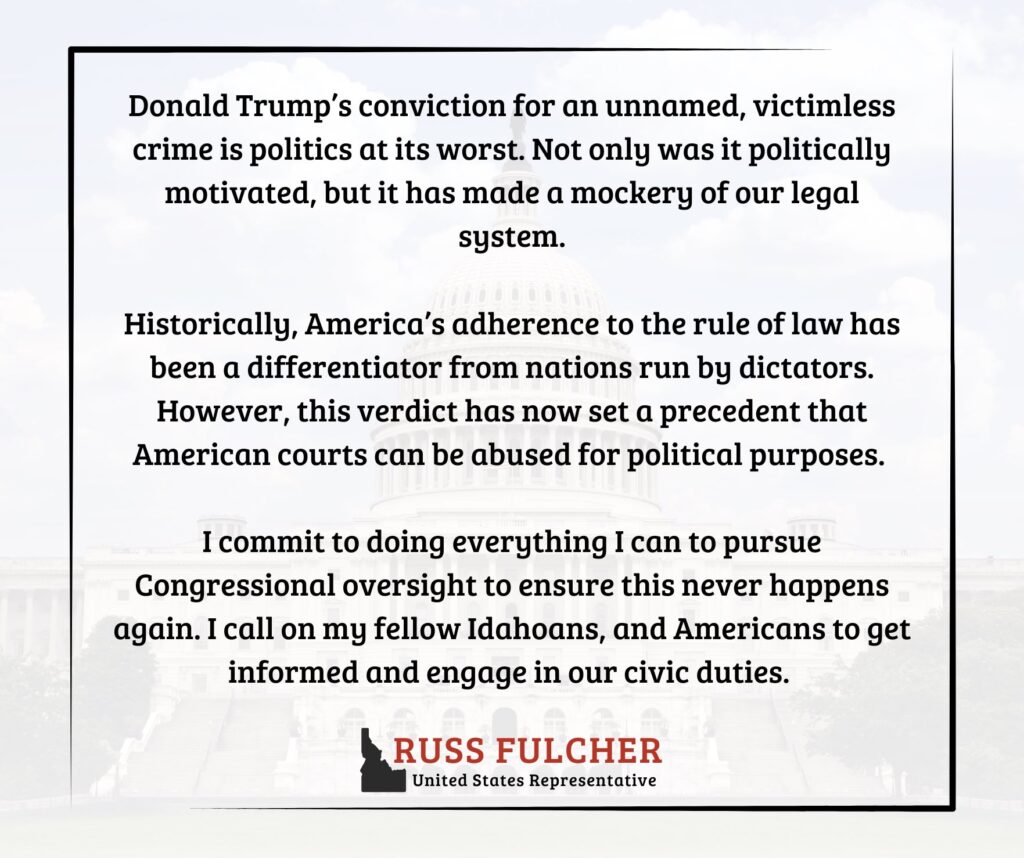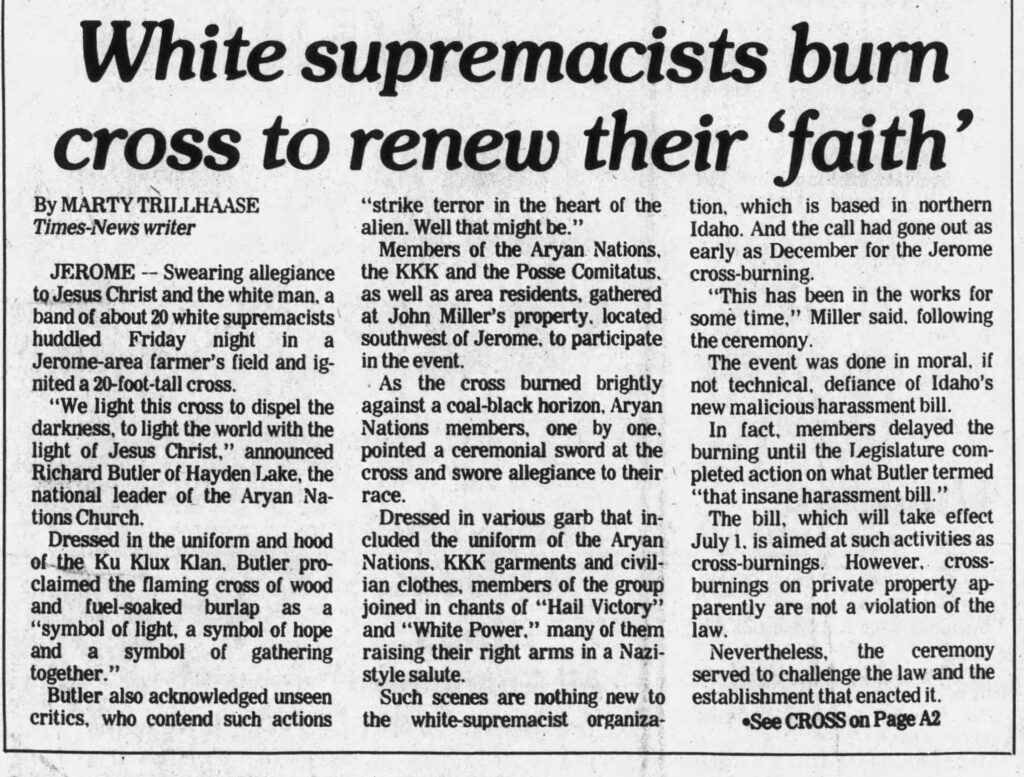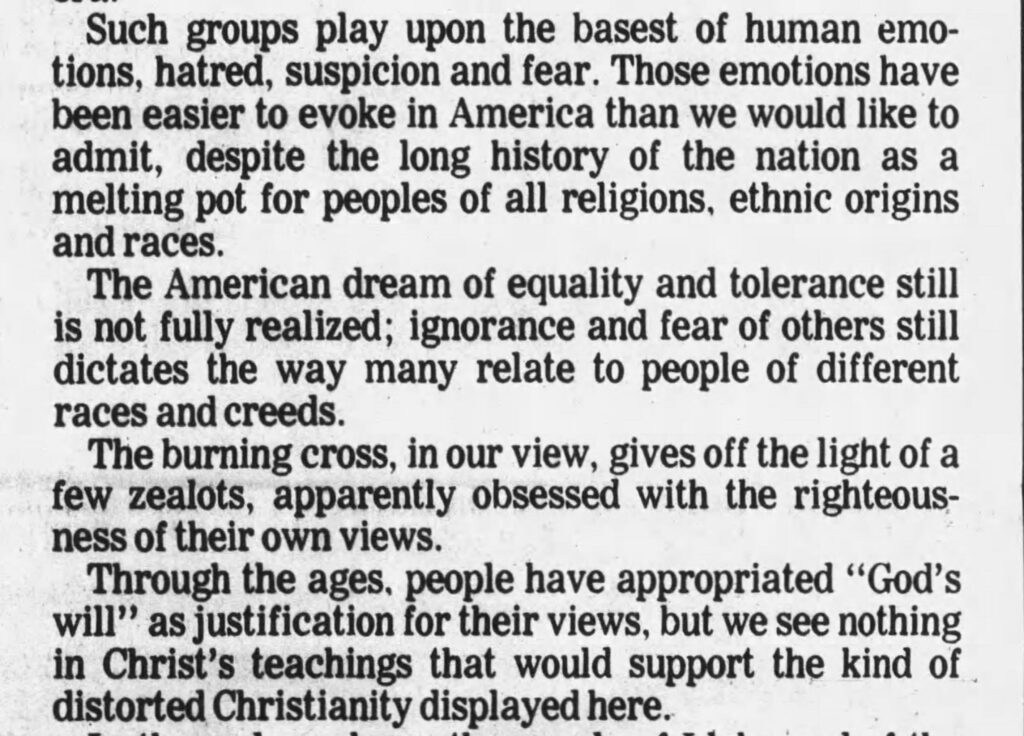The Trump Era – and, of course, the convicted felon himself – have done potentially irreparable harm to American democracy by perpetuating the greatest lie in our history, namely that a presidential election was fraudulent.
By repeating this lie over and over and over again an idea has been deeply embedded in the minds of millions that no election save the one Donald Trump wins is legitimate. All the court cases, the indictments and convictions for election interference, all the fraud of this big lie has reshaped American politics.
One poll earlier this year found one-third of Americans continue to believe the lie, and apparently there is no dissuading them.

The January 6, 2021 insurrection at our nation’s Capital was a natural outcome of this enormous lie. People who believed Trump and his fellow lie spreaders, and some who clearly wanted to believe, attempted to halt the peaceful transfer of power, a bedrock concept of American democracy that was never before in doubt, even in the tumultuous days before our Civil War.
Now comes Trump’s second big lie, namely that his recent conviction in a New York state court on 34 felony counts was a rigged process perpetrated by a “weaponized” U.S. Justice Department acting at the direction of the president of the United States.
This lie, as with the other big one, has now been amplified by nearly every Republican member of Congress, many of them with law degrees, providing at least a modicum of evidence that they know better, but still they lie.
Idaho: One State’s Embrace of the Big Lies
Consider the stunning pandering to Trump of former prosecutor now senator James E. Risch.
“As a former prosecutor,” Risch said, “I learned early the importance of our constitutional right to the due process of law. Due process is simply basic fairness … New York’s mock trial did not attempt even an appearance of fairness.”
Or Mike Crapo, a Harvard educated lawyer, who took to social media to proclaim that “a politically motivated prosecutor has ashamedly and unprecedentedly weaponized the legal system against a former United States President.” A “dangerous move,” the senator said, “threatening the security of our entire justice system.”
Or Congressman Mike Simpson, in full MAGA dudgeon and singing from the Trump script, also invoked the term “weaponized.” Trump’s unanimous guilty verdict, Simpson thundered, was the result of an “absurd political trial.”
Or Congressman Russ Fulcher: “Americans are awake; the current president’s unjust sham trial of a political opponent has mobilized an army of freedom-loving Americans to take our country back!” Fulcher actually attempted a twofer with his denunciation of the justice system, for good measure throwing in a reference to “unsecured elections.”

Let’s unpack the views of this Grand Old Party of “law and order,” as it once could call itself, by remembering an old saying that has never seemed more pertinent: “If the facts are against you, argue the law. If the law is against you, argue the facts. If the law and the facts are against you, pound the table and yell like hell.”
First, and most strikingly, no Republican, least not the four mentioned here, proclaimed Trump’s innocence. None dealt with the actual charges brought against him, including falsifying business records to hide a hush money payment related to his one night stand with adult film actress Stormy Daniels. Through this illegal scheme, prosecutors argued, and a 12 person jury agreed, Trump was determined to keep the tryst with a porn star secret from voters by paying hush money. The timing of these acts matter because at the time they happened the infamous “Access Hollywood” tape, where Trump bragged of grabbing women’s genitals, had recently been released.
This second big lie, like the first, can’t be bothered by evidence presented or the deliberate judicial process that brought 12 jurors to a unanimous decision. None of this was manufactured. Donald Trump did this to himself.
Then there is the Trumpian charge that Joe Biden engineered all this – “the current president’s unjust sham trial” – simply to get his political opponent. Again the facts are inconvenient.
New York prosecutor, Alvin Bragg, is a state prosecutor not answerable to the Justice Department. Biden didn’t appoint him. New York voters elected him just as Ada County voters elected Risch back in his prosecutor days. Trump might have been prosecuted in federal court for his crimes, but he wasn’t. It was a state-level prosecution based on state law.
And what of the “weaponized” Justice Department of a Democratic administration? Maybe Republicans are referring to the “weaponized” prosecution of the president’s son, Hunter Biden, by the U.S government.
Or perhaps Republicans are thinking of the “weaponized” prosecution on federal corruption charges, again by the Biden Justice Department, of two Democratic – New Jersey Senator Robert Menendez and Texas Congressman Henry Cuellar. Menendez is being prosecuted for, among other things, accepting payoffs from foreign governments, a charge problematic enough for Democrats that they risk a safe Senate seat as a result. Yet, Biden’s “weaponized” Justice Department is pressing the case against a high profile Democrat.
And what of those 12 New York jurors? It was telling that Trump trial judge, New York County Supreme Court Justice Juan Merchan, told potential jurors at the outset of jury selection that anyone who didn’t want to be considered for the Trump jury could simply leave. Many did, presumably some of them not eager to run the risk of being harassed, or worse, by Trump and his followers.
The remaining jurors, including all those selected for the trial, were subject to vetting by Trump’s defense team. The dozen selected, at least before the verdict, satisfied those lawyers.
Imagine their responsibility: The first former president indicted and convicted of a felony. That these jurors took their civic duty as a solemn, patriotic responsibility of citizenship deserves not only respect but deference.
Calling the Trump trial an “absurd political trial,” as Simpson did, or a “mock trial,” as Risch has done has one particularly pernicious outcome. It denigrates the American citizens who served on that jury – the people who actually heard the evidence and had the duty to sift through all of it – despite knowing they might well jeopardize their own personal safety by signing on for the responsibility.
And what are these Idaho elected officials saying by playing their own voters for such rubes? How do they credibly dismiss 34 felony convictions? And what of the 54 charges still pending against Trump? Is each and every one a manufactured “absurd political trial” where “mock” justice will play out?
We know – all of us know – why Risch and Crapo and the rest are behaving as they are. They are afraid.
Afraid of Trump.
Afraid of the MAGA mob.
Afraid of a future primary opponent.
Afraid of losing a job.
Afraid, as former Maryland Governor Larry Hogan has discovered, that one can be cast out of the party of “law and order” for simply saying that Americans should respect the outcome of a trial.
The second big lie joins the first as Trump’s contribution to America’s future. Recovery from these lies will not be easy or quick, and the next few months will determine whether recovery is even possible.
This November we will not merely elect a president. We will conduct a referendum on whether American institutions, including courts and judges and juries, can again be respected and defended.
Tragically, many Republicans have already voted NO.
—–0—–
Additional Reading:
A few other items of note …
A Republican Election Clerk vs. Trump Die-Hards in a World of Lies
Remarkable story here about how the lies have impacted a long-time county clerk in a rural county in Nevada.
“This is actually insane,” said Angela Jewell, the deputy clerk. “This is how democracies end. There must be some way to reason with a few of these people.”
Link to full story here.
The MLB just integrated its records. The Pulitzers should follow baseball’s lead
“Now and then since 1974, the Pulitzer Prize Board has offered special citations to figures, mostly in music and the arts. These have included Black artists such as Duke Ellington, Thelonious Monk, John Coltrane, Scott Joplin and Aretha Franklin, who joined white honorees such as George Gershwin, Bob Dylan and Hank Williams.
“The work of those Black artists could certainly be joined with future Pulitzer Legacy Prize winners which, over time, would create a coherent historical, literary, cultural, and journalistic record that would fill out the story of America’s greatness.”
Great piece from Poynter.
The death and life of the great British pub
I’m a sucker for this kind of story.
“Dave Murphy was 11 in 1978, the year his parents signed their first lease at the Golden Lion, and moved the family in to rooms on the building’s upper storeys. Their previous home, in Holloway, had backed on to a prison. Now Dave got to tell school friends he lived in a pub. Before remaking himself as a landlord, John Murphy, originally from Cork, had worked for years in London as a bus driver. Mary, from Galway, had been a nurse. ‘You’re nursing the sick. And suddenly you’re nursing the drinkers,’ Mary recalled, of the transition. ‘I don’t think I found it too difficult.'”
From the archives of The Guardian.
Thanks for reading. Always good to hear from you. And all the best.

















 Chief Justice John Roberts cousin will be sitting in a seat reserved for family members when the United States Supreme Court hears arguments on the California same sex marriage case tomorrow. Jean Podrasky is 48, a resident of San Francisco and has been in a committed relationship for four years. She hopes to get married. It may well take the vote of her cousin, the Chief Justice, to allow Jean to marry her partner Grace Fasano because Ms. Podrasky is lesbian.
Chief Justice John Roberts cousin will be sitting in a seat reserved for family members when the United States Supreme Court hears arguments on the California same sex marriage case tomorrow. Jean Podrasky is 48, a resident of San Francisco and has been in a committed relationship for four years. She hopes to get married. It may well take the vote of her cousin, the Chief Justice, to allow Jean to marry her partner Grace Fasano because Ms. Podrasky is lesbian.
